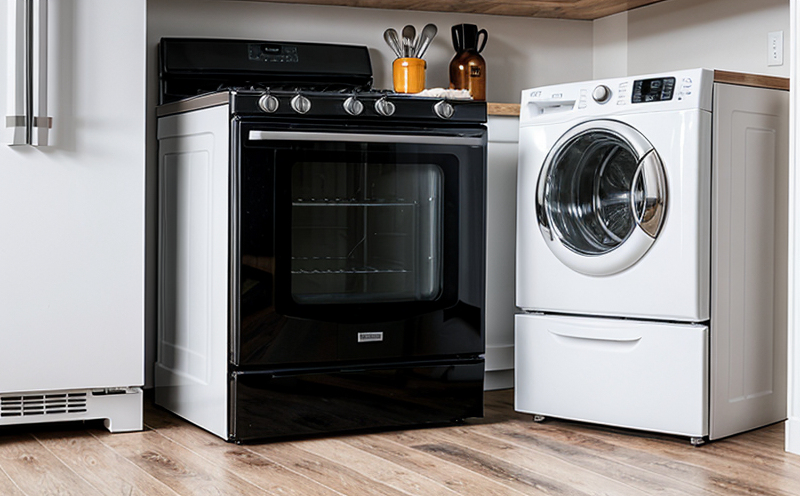PCB Electrical Safety Testing in Appliances
The Printed Circuit Board (PCB) is a critical component within household appliances. It serves as the central nervous system, facilitating the flow of electrical signals that power and control various functions. Ensuring PCB electrical safety is paramount for preventing fires, electric shocks, and other hazards that could compromise product performance and user safety.
Consumer products, especially those in constant use like refrigerators, washing machines, dishwashers, and ovens, are subject to rigorous testing to ensure they meet stringent safety standards. This service focuses on the electrical aspects of PCBs within these appliances, ensuring compliance with international and national regulations such as UL 60335-2 and IEC 60730.
The process involves a series of tests that assess various parameters including insulation resistance, dielectric strength, leakage current, and temperature rise. These tests are critical in identifying potential weaknesses or vulnerabilities within the PCB design, which could lead to electrical failures under normal operating conditions.
Proper preparation is essential before testing begins. This includes cleaning the PCB to remove any contaminants that might affect test results, ensuring all components are securely mounted, and applying appropriate grounding techniques to isolate external interference. Once prepared, the PCB is subjected to a range of tests designed to simulate real-world operating conditions.
The instrumentation used in these tests provides precise measurements and data analysis necessary for evaluating the PCB's performance. This includes high-voltage testers, dielectric strength analyzers, and thermal imaging cameras that help detect hotspots on the board. The results from these tests are then carefully analyzed to determine compliance with relevant safety standards.
Reporting the findings of these tests is a crucial step in ensuring product safety. Detailed reports provide insights into any deficiencies found during testing and recommendations for corrective actions if necessary. These reports serve as critical documentation that can be referenced by quality managers, R&D engineers, and procurement teams to improve future designs and manufacturing processes.
By adhering to strict electrical safety standards and undergoing thorough PCB electrical safety tests, manufacturers can enhance the reliability and longevity of their products while also protecting users from potential hazards. This service plays a vital role in maintaining high-quality standards within the consumer product sector, ensuring that every appliance meets the highest levels of safety and performance.
Why It Matters
The importance of PCB electrical safety testing in household appliances cannot be overstated. Electrical failures within these devices can lead to severe accidents, including fires and electric shocks, posing significant risks to both consumers and the environment. Ensuring that each component operates safely is not only a legal requirement but also a moral obligation towards end-users.
International standards such as UL 60335-2 and IEC 60730 provide guidelines for testing PCBs in appliances, emphasizing insulation resistance, dielectric strength, leakage current, and temperature rise. These tests help identify potential weaknesses that could otherwise go unnoticed until a malfunction occurs.
From the perspective of quality managers, compliance officers, R&D engineers, and procurement teams, these tests offer valuable insights into product performance and reliability. They serve as essential tools for identifying design flaws, optimizing material choices, and improving overall manufacturing processes. By adhering to these standards, companies can build trust with consumers and maintain a competitive edge in the market.
Real-world scenarios underscore why this testing is so critical. For instance, a faulty PCB in a washing machine could cause an electric shock during operation or even catch fire if insulation fails under high voltage stress. Similarly, a refrigerator's control board that doesn't meet temperature rise limits could lead to inefficient cooling and higher electricity consumption.
Conducting thorough electrical safety tests ensures that products not only function correctly but also do so safely. This proactive approach helps prevent accidents and improves customer satisfaction, ultimately contributing to the success of any product line in the consumer market.
International Acceptance and Recognition
- The United States recognizes UL 60335-2 as a standard for electrical safety testing of household appliances. Compliance with this standard ensures that products are safe for use in North American markets.
- Europe follows the IEC 60730 series, which includes specific parts addressing various aspects of appliance safety, including PCB performance. Meeting these standards is essential for European manufacturers aiming to sell their products across the continent.
Many countries around the world have adopted these international standards as benchmarks for product safety. By adhering to these guidelines, manufacturers can ensure that their appliances meet global standards and gain acceptance in diverse markets.
The widespread adoption of these standards reflects a commitment to consumer safety and environmental protection. It also highlights the importance of consistent testing procedures across different regions, ensuring that all users benefit from safe and reliable products regardless of location.
Competitive Advantage and Market Impact
- Compliance with international safety standards can significantly enhance a company's reputation. Consumers are increasingly aware of the importance of product safety, making compliance an attractive feature for potential buyers.
- Meeting these standards opens doors to new markets and opportunities for expansion. Companies that demonstrate their commitment to quality through rigorous testing can attract more customers and partners globally.
The ability to provide comprehensive PCB electrical safety testing services positions a laboratory as a trusted partner in the industry, offering valuable insights into product performance and reliability. This expertise not only supports existing clients but also attracts new business from manufacturers looking to improve their offerings.
In an increasingly competitive market where customer trust is paramount, demonstrating adherence to global standards can be a deciding factor for many consumers. By ensuring that every appliance meets the highest levels of safety, companies can build long-term relationships with satisfied customers and secure a strong foothold in the market.





